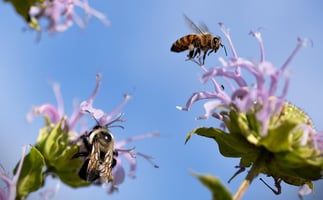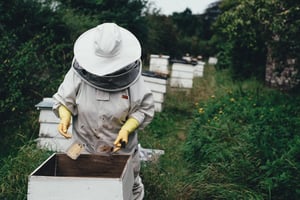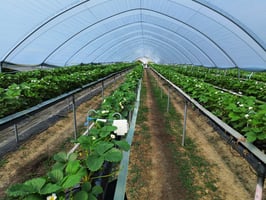Spring is finally here, and with it comes the vibrant bloom of flowers, whether in our gardens or...
Precision pollination for improved nutrition and shelf life
 Project Duration:
Project Duration:
24 Months September 2023 to August 2025.
Project Partners:
UK ATC, AgriSound, PheroSyn, Biobest, National Institute of Agricultural Botany (NIAB)
Funder:
Innovate UK
Objective:
To improve the nutritional quality, yield, and shelf-life of UK-grown strawberries by optimising insect pollination using advanced monitoring and behavioural interventions.
Context:
The UK relies heavily on imports for key micronutrients such as vitamin C, with around 74% sourced from overseas, leaving the nation vulnerable to supply chain shocks. At the same time, fewer than 30% of UK adults consume the recommended daily intake of fruit and vegetables. Strawberries, one of the country’s most commercially valuable fruit crops, are naturally rich in vitamin C and widely consumed due to their taste and convenience. However, their yield, shape, and nutritional quality are all highly dependent on effective insect pollination.
Technology & Innovation:
🐝 AgriSound will adapt its acoustic monitoring devices into low-cost Bluetooth sensors for high-density deployment in strawberry tunnels.
🐝 PheroSyn will develop bumblebee pheromone lures (attractant/repellent) to direct pollinator activity where under/overpollination is detected.
🐝 NIAB trials will calibrate the relationship between pollinator activity, pollination quality, berry yield, nutrition (vitamin C, phenolics, antioxidants), and shelf-life.
Significance:
This project addresses gaps in pollination management, providing growers with new tools to actively influence bee behaviour and optimise crop outcomes — a capability not currently available.
Impact Goals:
🐝 Increase marketable yield of strawberries by reducing misshapen fruit.
🐝 Enhance nutritional value (vitamin C and antioxidants) of UK-grown strawberries.
🐝 Extend shelf-life, reducing food waste in shops and households.
🐝 Provide guidance and know-how for growers and retailers on pollination-driven quality improvements.
🐝 Deliver transferable technologies applicable to other pollination-dependent crops.
"Pollination underpins the quality and resilience of our food system, yet it’s often overlooked as something farmers cannot influence. This project is about changing that. By combining our sensor technology with innovative behavioural tools, we can give growers real-time insights and practical ways to optimise pollination. For strawberries, that means more marketable fruit, higher vitamin C levels, and longer shelf-life – benefits that flow from farm to retailer to consumer. It’s an exciting step towards a future where we can harness pollinator activity to improve both food security and nutrition in the UK."



